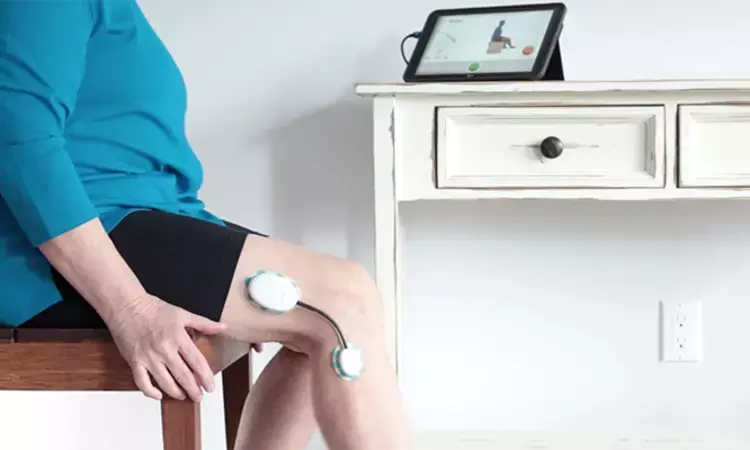- Home
- Medical news & Guidelines
- Anesthesiology
- Cardiology and CTVS
- Critical Care
- Dentistry
- Dermatology
- Diabetes and Endocrinology
- ENT
- Gastroenterology
- Medicine
- Nephrology
- Neurology
- Obstretics-Gynaecology
- Oncology
- Ophthalmology
- Orthopaedics
- Pediatrics-Neonatology
- Psychiatry
- Pulmonology
- Radiology
- Surgery
- Urology
- Laboratory Medicine
- Diet
- Nursing
- Paramedical
- Physiotherapy
- Health news
- Fact Check
- Bone Health Fact Check
- Brain Health Fact Check
- Cancer Related Fact Check
- Child Care Fact Check
- Dental and oral health fact check
- Diabetes and metabolic health fact check
- Diet and Nutrition Fact Check
- Eye and ENT Care Fact Check
- Fitness fact check
- Gut health fact check
- Heart health fact check
- Kidney health fact check
- Medical education fact check
- Men's health fact check
- Respiratory fact check
- Skin and hair care fact check
- Vaccine and Immunization fact check
- Women's health fact check
- AYUSH
- State News
- Andaman and Nicobar Islands
- Andhra Pradesh
- Arunachal Pradesh
- Assam
- Bihar
- Chandigarh
- Chattisgarh
- Dadra and Nagar Haveli
- Daman and Diu
- Delhi
- Goa
- Gujarat
- Haryana
- Himachal Pradesh
- Jammu & Kashmir
- Jharkhand
- Karnataka
- Kerala
- Ladakh
- Lakshadweep
- Madhya Pradesh
- Maharashtra
- Manipur
- Meghalaya
- Mizoram
- Nagaland
- Odisha
- Puducherry
- Punjab
- Rajasthan
- Sikkim
- Tamil Nadu
- Telangana
- Tripura
- Uttar Pradesh
- Uttrakhand
- West Bengal
- Medical Education
- Industry
Wearable Sensors may help monitor Rehabilitation and complications remotely Following Knee Arthroplasty Surgery

Total knee arthroplasty requires effective rehabilitation to achieve optimal results, but institutions often rely on unsupervised home exercises due to cost constraints. Wearable sensors have become increasingly popular as a potential method of monitoring patients remotely to ensure efficacy and compliance.
Wearable sensors also offer bespoke rehabilitation for patients based on their individual expectations and goals. They provide a means for two-way communication between the clinical team and the patient and can allow for objective data on pain and function to be captured. This empowers patients to take control of their rehabilitation.
Trials have been conducted using wearable sensors which can be classified as either knee sensors which are inertial measurement units to specifically monitor the knee joint or general physical activity sensors such as commercially available pedometers. Technological interventions allow home-based telerehabilitation. This may provide the supervision needed for greater compliance and effectiveness, while also significantly reducing health resource use associated with face-to-face rehabilitation.
A systematic review of the literature from 1st January 2000 to 17th February 2022 was undertaken by Samuel W. King et al. The study has been published in ‘Indian Journal of Orthopaedics.’ Devices were categorized as joint-specific or physical activity sensors. Studies were classified as those providing remotely supervised rehabilitation as an additional or as an alternative intervention.
Key findings of the study were:
• Remotely supervised rehabilitation using wearable sensors demonstrated similar outcomes when provided as an alternative to standard care in most studies.
• One group found improved outcomes for knee-specific sensors compared with standard care.
• There were improved physical activity and healthcare resource use outcomes described in the literature where sensors were used in addition to standard care.
• This review found evidence for the use of wearable sensors in remotely supervised rehabilitation following knee arthroplasty surgery. This included methodological heterogeneity, differing definitions of standard care, and variable follow up periods. Robust randomized control trial data with a longer follow-up period are needed.
The authors concluded that – “The use of remotely monitored rehabilitation with wearable sensors has the potential to provide the advantages of supervised rehabilitation with respect to compliance and assessment of complications. It may also reduce the costs of post-operative rehabilitation following arthroplasty surgery, which is known to be highly variable between individuals, institutions and healthcare systems. Continuous data collection enables monitoring of temporal changes in a more meaningful way rather than simply using snapshot data when a patient visits the clinic at a certain time point. The use of Artificial Intelligence to diagnose and predict patients with poor or suboptimal outcomes will help reduce the further burden on healthcare, improve patient satisfaction and ensure timely rehabilitation in patients undergoing a total knee replacement.”
Further reading:
“Wearable Sensors to Guide Remote Rehabilitation Following Knee Arthroplasty Surgery”
Samuel W. King, Momin Eltayeb et al
Indian Journal of Orthopaedics (2023) 57:624–634
https://doi.org/10.1007/s43465-022-00785-3
MBBS, Dip. Ortho, DNB ortho, MNAMS
Dr Supreeth D R (MBBS, Dip. Ortho, DNB ortho, MNAMS) is a practicing orthopedician with interest in medical research and publishing articles. He completed MBBS from mysore medical college, dip ortho from Trivandrum medical college and sec. DNB from Manipal Hospital, Bengaluru. He has expirence of 7years in the field of orthopedics. He has presented scientific papers & posters in various state, national and international conferences. His interest in writing articles lead the way to join medical dialogues. He can be contacted at editorial@medicaldialogues.in.
Dr Kamal Kant Kohli-MBBS, DTCD- a chest specialist with more than 30 years of practice and a flair for writing clinical articles, Dr Kamal Kant Kohli joined Medical Dialogues as a Chief Editor of Medical News. Besides writing articles, as an editor, he proofreads and verifies all the medical content published on Medical Dialogues including those coming from journals, studies,medical conferences,guidelines etc. Email: drkohli@medicaldialogues.in. Contact no. 011-43720751


